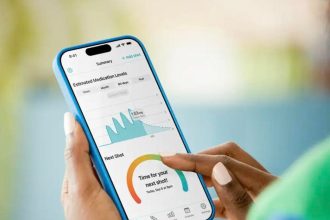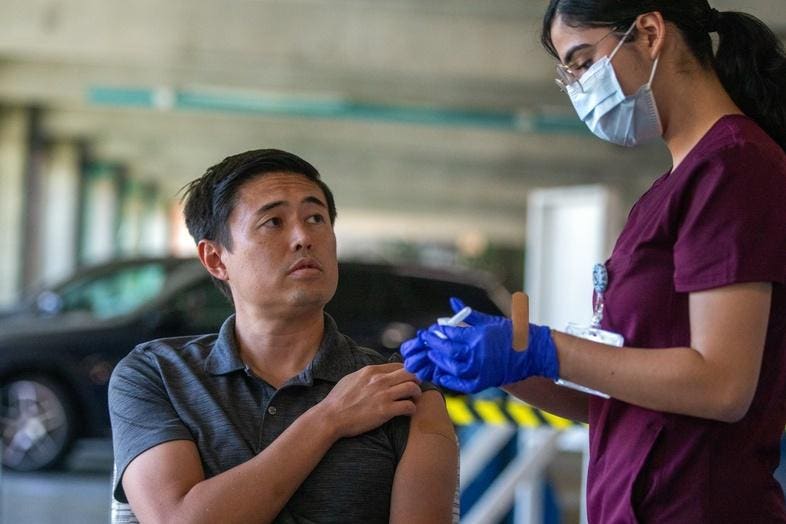Remember Covid-19? You know that thing that has led to over 1.15 million American dying since early 2020? And that thing that may have left well over 8 million Americans to continue suffering with long Covid? Well, fewer and fewer people in the U.S. these days seem to be viewing the severe acute respiratory syndrome coronavirus 2 (SARS-CoV-2) as a real threat based on the low uptake of the latest updated Covid-19 vaccine and the results from a recently conducted KFF survey.
As you probably know from seeing all those noses out there, many people have completely dropped the use of face masks as if the masks were soiled underwear. Fewer and fewer businesses seem to be maintaining any type of Covid-19 precautions such as running air purifiers or even keeping hand sanitizer dispensers filled. And just 5.4% for children, 14.8% of all adults 18 years and older, and 31.7% of adults 65 years and older have gotten the latest set of Covid-19 vaccines, according to Centers for Disease Control and Prevention (CDC) numbers as of November 17.
Why have these updated vaccine numbers been so low? Well, the KFF survey revealed that over half of those adults who had gotten vaccinated against Covid-19 previously but did not get the latest “updated” Covid-19 vaccine pointed to, guess what, not being worried about Covid-19 as being the main reason for not getting the latest, greatest shot.
No matter how any may try to spin it, the roll-out of the updated vaccine this Fall has been far from a rousing success. The updated vaccine targets the XBB.1.5, Omicron subvariant of the SARS-CoV-2, which sounds like a mouthful and is the subvariant that was the dominant circulating one through early 2023. Thus, this updated vaccine should offer significantly better protection against the alphabet soup of subvariants that have been circulating of recent such as the EG.5 and the BA.2.86. Plus, getting the updated vaccine can help address the wane’s World problem with Covid-19 vaccines. The protection offered by Covid-19 vaccine begins to wane four to six months after vaccination. Thus, you can view getting the updated vaccine a bit like updating the software in your smartphone. If you last got vaccinated sometime in early 2023 or earlier, it’s not clear how well protected against Covid-19 you currently may be.
Nevertheless, interest in getting vaccinated against Covid-19 has certainly dropped like a rock in a hot tub since 2020 and 2021. The percentages of American who have gotten the updated vaccine are way lower than the 69.5% of all Americans and 79.1% of American adults who’ve been “fully vaccinated,” meaning that they received their primary series of the Covid-19 vaccines. Heck the updated vaccine rates are even lower than current influenza vaccination rates with 35.1% of children, 36.3% of all adults, and 59.5% of adults age 65 and older already having gotten their flu shots this season. So, the low uptake of the updated Covid-19 vaccine may be due specifically to a Covid-19 perception thing rather a general vaccine perception thing.
Indeed, this latest KFF Covid-19 survey, which queried a nationally representative sample of 1,301 U.S. adults via telephone or the Internet from October 31 through November 7, 2023, has given a Covid-in-the-air-but-I-don’t-care picture of how many Americans may be thinking. Even though the past three Holiday seasons have experienced Covid-19 surges, only 31% of the survey respondents were worried about spreading Covid-19 to others and only 28% were worried about getting seriously sick from Covid-19. About half of respondents indicated that were not going to take any of the Covid-19 precautions indicated in the survey questions. Only 35% planned on avoiding large gatherings, only 30% planned on wearing face masks in crowded locations, and only 18% planned on taking a Covid-19 tests prior to visiting with friends or family. Think about that when you share some fruitcake with extended family and friends at your next Holiday gathering.
Are all of these low numbers really that surprising given that so many politicians and business leaders have been seemingly trying to sweep SARS-CoV-2 under the rug since 2021? People have politicized the heck out of Covid-19 and Covid-19 precautions, which may have made politicians a bit wary about taking a harder Covid-19 prevention stand. There’s been no real clear messaging from the White House and federal government about what specific Covid-19 precautions should be taken this Fall and coming Winter. That lack of clarity can leave a lot of people guessing and relying more on whatever bleep may be spreading on social media, which can be like relying on what’s written on bathroom stalls to make career, romantic, and life decisions. Moreover, without a more comprehensive national surveillance system, it’s become increasingly difficult to track SARS-CoV-2 activity and know where and when people may be at greater risk for catching the virus. Thus, the U.S. seems to be flying a bit blind about what to do about Covid-19 going forward.
As the hashtag #Covidisnotover has continued to emphasize on social media, Covid is not over. It’s not the same threat that it was in 2020. But getting Covid-19 now is still no joke. Even if you’ve been vaccinated, you can still get long Covid and more severe Covid-19, albeit it’s a less and less likely possibility the more updated you are on vaccination. All indications are that the SARS-CoV-2 will continue to circulate. Viruses don’t respond to that life coaching mumbo jumbo that says “if you believe it, it will happen” or “mind over matter” or “fake it until you make it.” This doesn’t mean that you should live in fear of the virus and not do what you want to do in life. It does mean that there needs to be more of a clear national plan on how to deal with the SARS-CoV-2 now and into the future.
Read the full article here





